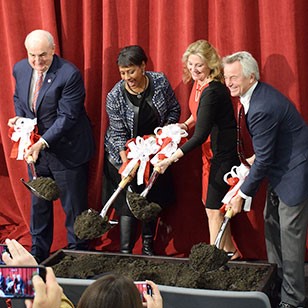
(From left to right) IU president Michael McRobbie, IU Trustee Donna Spears, IU Trustee MaryEllen K. Bishop, and IU alumnus Fred Luddy turned the ceremonial shovels at the event.
The ancient task of the turning of a spade set the Luddy School of Informatics, Computing, and Engineering on its next steps into tomorrow during the groundbreaking for the Luddy Center for Artificial Intelligence held in Dorsey Learning Hall in Luddy Hall Feb. 24.
Indiana University President Michael A. McRobbie was joined by IU Bloomington Provost and Executive Vice President Lauren Robel, Luddy Dean Raj Acharya, and others in a ceremony to mark the beginning of construction for the $22.8 million facility, which will feature state-of-the-art teaching and learning spaces dedicated to supporting IU faculty and students who will conduct pioneering research into AI and machine learning. The Luddy Center for Artificial Intelligence will initially focus on digital health.
“This remarkable facility is being planned to meet the rapidly evolving teaching and research activities of the Luddy School of Informatics, Computing, and Engineering,” McRobbie said. “It will be a vital hub for the faculty and students of the Luddy School and of other academic units on campus for developing artificial intelligence solutions to the most pressing challenges faced by society, including digital health care.”
Funding for the building is part of a historic, $60 million gift from IU alumnus Fred Luddy, which was announced last fall. The Luddy Center for Artificial Intelligence will be part of the planned Mind, Brain, and Machine Quadrangle that includes the Psychological and Brain Sciences Building, the Multidisciplinary Science Building II, the cognitive science program at the nearby Geology Building, the Luddy School’s Myles Brand Hall, and Luddy Hall.
“Groundbreaking… one definition is doing something innovative that has never been done before,” Luddy said. “I think that’s what we’re here for—something groundbreaking. I’m very happy to see the beginning of our groundbreaking innovation that’s going to happen with this school and with this new complex.
“I love this quote. ‘Many complicated problems in the physical, biological and social sciences, business, and education require the employment of modern high-speed computing machines as a practical solution.’ That was said by Dr. Herman Wells in 1953. I think Dr. Wells would be extremely proud that IU’s vision is being carried on today.”
The Luddy Center for Artificial Intelligence will be a 58,000-square-foot facility that also will include a parking structure.
“The Mind, Brain, and Machine Quadrangle, and the Luddy Center for Artificial Intelligence, in particular, will serve as the hub from which the Silicon Prairie will grow,” Acharya said. “We stand at a pivotal moment in this journey to tomorrow. This groundbreaking ceremony is just the first of many celebrations that will center around this facility as we create our path in AI.”
The ceremony included remarks from Associate Dean for Research at the Luddy School Kay Connelly, and Aidan Whelan, a senior in the intelligent systems engineering program at Luddy. McRobbie also conferred IU Bicentennial Medals to Luddy and to architect Kalevi Huotilainen, the design principal at BSA LifeStructures, for their contributions to Indiana University.
“Historically, AI research has looked inwards,” Connelly said. “As it has shifted its focus outward, it has brought us to the cusp of a revolution that will see AI used in every discipline, creating not just more intelligent machines but a more intelligent world. The Luddy Center for Artificial Intelligence will inevitably become the hub of innovations that brings together technologists with researchers throughout campus to push the boundaries of every field.”
The potential for collaboration at the Luddy Center for AI was a focus for Robel, as well.
“Not only will the cross-discipline conversations and collaborations that are so characteristic of IU Bloomington allow for creativity in thinking; they will also help raise necessary questions and considerations in a field as rapidly evolving as that of artificial intelligence,” Robel said. “This is especially important considering the critical nature of the center’s future work and its impact on digital health and medicine.”
The Luddy Center for Artificial Intelligence will begin construction this spring as is expected to be completed by the fall of 2021. Luddy hopes the new facility will be just the beginning.
“We’re building a 60,000-square-foot center to house the AI portion, and I hope and believe we will be out of space in 10 years,” Luddy said. “And that will be good news. We can only say, once again, welcome to the starting line.”

